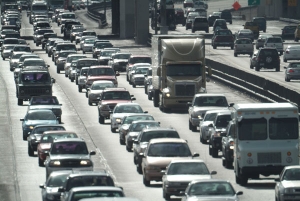
Nationwide, city executives and transportation officials are examining mobility issues and trying hard to solve congestion problems. Funding is never adequate and frustration grows in both the public and private sectors as traffic congestion becomes almost unbearable. With little relief in sight and transportation needs escalating, citizens throughout the U.S. will be asked to vote on bond packages or tax increases worth billions of dollars in November.
 Most regions are attempting to solve mobility issues in a multitude of ways. In Texas, the city of Austin will ask citizens to approve a $720 million transportation bond package. The funding, however, doesn’t all go to roads, bridges and/or traffic congestion relief. The package also includes millions for the planning, designing, engineering, constructing, renovating and upgrading of bikeways, sidewalks, trails and dedicated cycling and pedestrian walkways. An estimated $27.5 million will be used for Safe Routes to Schools projects. Approximately $26 million is allocated for urban trails and $20 million for bikeways. About $100 million will be used on roads and bridges.
Most regions are attempting to solve mobility issues in a multitude of ways. In Texas, the city of Austin will ask citizens to approve a $720 million transportation bond package. The funding, however, doesn’t all go to roads, bridges and/or traffic congestion relief. The package also includes millions for the planning, designing, engineering, constructing, renovating and upgrading of bikeways, sidewalks, trails and dedicated cycling and pedestrian walkways. An estimated $27.5 million will be used for Safe Routes to Schools projects. Approximately $26 million is allocated for urban trails and $20 million for bikeways. About $100 million will be used on roads and bridges.
Detroit hopes to get approval to spend $4.6 billion on a 20-year project that will include significant transit improvements. Most of the funding will be allocated to the construction of a light-rail project between Detroit and Ann Arbor.
Bay Area Rapid Transit (BART), which serves the San Francisco Bay area, has announced a large bond vote – a $3.5 billion package. The funding will be used to rebuild its aging 44-year-old rail system. Serving 430,000 passengers each day now is a significant increase over the 170,000 per week served when the system opened in 1972. BART wants to address rails, tunnels and reliable electricity to power the train cars. Transportation officials contend that more capacity for the train system will result in fewer motor vehicles on heavily congested streets.
City officials in Kansas City, Mo., are asking voters to approve a property tax to pay for $800 million for mobility projects. The city wants to improve streets, sidewalks, bridges and other infrastructure. This plan also has a number of diversified mobility options. While voters are being asked to approve taxes for the mobility options, the Regional Transit Alliance is also seeking an election to increase property and sale taxes to pay for streetcars. Voters may have to think hard about how they vote.
Most drivers don’t plan to give up motor vehicles in the interest of curbing traffic congestion, and without adequate mobility and transit choices, that’s not an option anyway. There are no quick answers or easy choices. And, unfortunately, no low-cost solutions.
Strategic Partnerships, Inc. offers customized research services for companies wishing to identify upcoming public sector contracting opportunities in construction and other industries. Contact us to learn more about our government market research capabilities.
